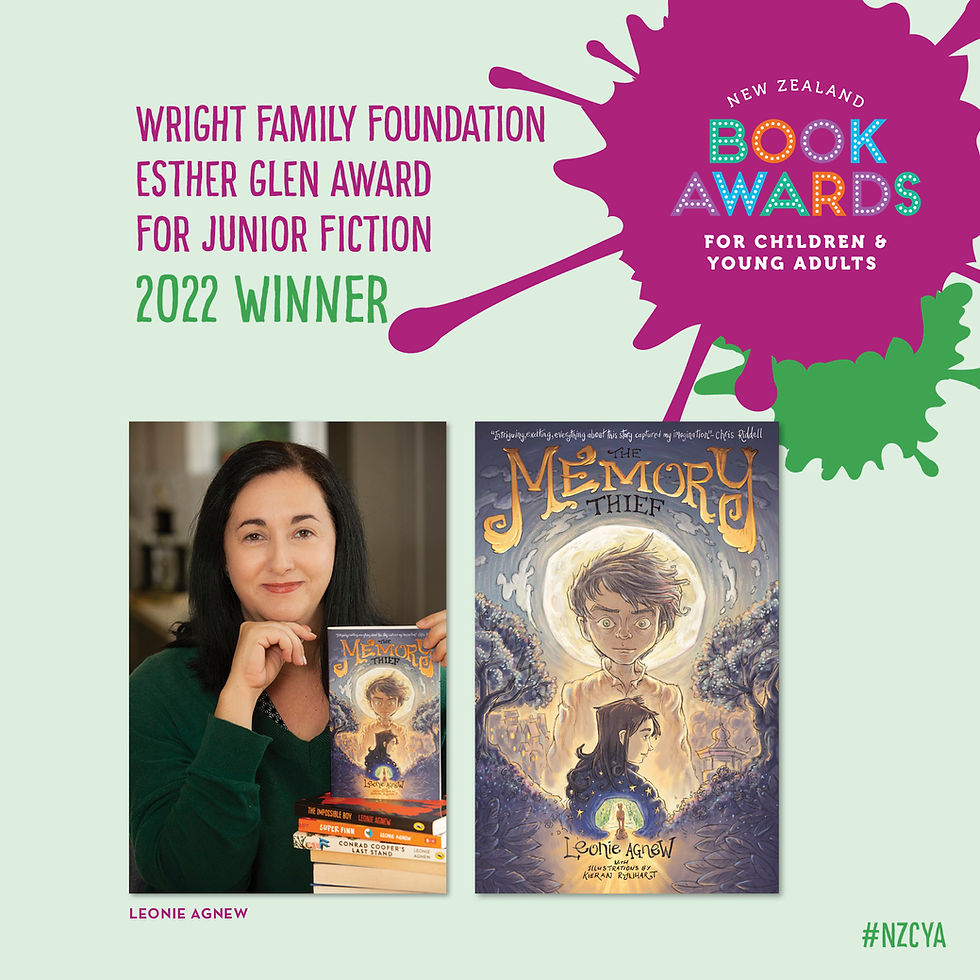The Winners of the 2022 NZCYA awards are...
- Briar Lawry

- Aug 10, 2022
- 4 min read
Article by Briar Lawry
The day has come, the occasion where even a hiatus can't keep us down! The New Zealand Book Awards for Children and Young Adults was held on the evening of 10 August, and although distance and lurgy kept Team Sapling from being in attendance, we were there in spirit – and online. If you missed it, here's the scoop!

The big winner of the night won't have have come as a shock to any children's literature connoisseur. Gavin Bishop's Atua (Puffin, Penguin Random House) took away not one but two category prizes, as well as the supreme award of the night: the Margaret Mahy Book of the Year.
If you read Editor Sarah's round-up of the finalists, you'll know that she picked it to win each of the categories it was nominated in: the Elsie Locke Award for Non-Fiction and the Russell Clark Award for Illustration. Internet chocolate fish headed her way! Sarah described it as "drop-dead gorgeous" and "beautifully designed". Or in other words, it's "Gavin Bishop continuing to draw and write at the top of his game."
According to convenor of the judges Pauline (Vaeluaga) Smith, “Atua is an instant classic, a ‘must have’ for every Kiwi household and library, that is packaged in stunning
production values."

This is the fifth time that Gavin has been a recipient or co-recipient of the supreme award at the NZCYA Awards – more than anyone else. According to my on-the-fly data crunching, it's also the fifth year in a row that the prize has been won by a Māori or Pasifika author, with Atua following on from the work of Sacha Cotter and Josh Morgan, Selina Tusitala Marsh, Tania Roxborogh, and... Gavin Bishop again in 2019 for Aotearoa!
Want another dash of Gavin Bishop celebration? Check out this author co-interview between Gavin and this year's Jann Medlicott Acorn Prize for Fiction winner Whiti Hereaka! We sure know how to pick our writers...
The top gong may have gone to Gavin, but there were five other greatly deserving winners on the night. Ruth Paul reclaimed the Picture Book Award, having previously won in 2018 for I Am Jellyfish (a book I think I personally hand-sold more than any other picture book in my time at Little Unity).

This year, Ruth's Lion Guards the Cake (Scholastic New Zealand) was the winner in a field of real treasures. Sarah called it "the type of book with universal appeal that you’ll eventually need to hide because you’ve read it too many times" and the judges described the author-illustrator's book as "confident storytelling of the highest calibre". (Lion Guards the Cake was released during The Sapling's hiatus so we don't have any dedicated coverage.)
In the world of fiction with more words than pictures, the winners were The Memory Thief by Leonie Agnew (Puffin, Penguin Random House) for the Wright Family Foundation Esther Glen Award for Junior Fiction, and Learning to Love Blue by Saradha Koirala (Record Press) won the Young Adult Fiction Award.

Sarah described The Memory Thief as "intricately told and felt" with a "genuinely nail-biting" chase scene. Likewise, the judges called it "imaginative and thought-provoking" – all the sorts of adjectives you love to hear when looking for a new pick for a middle-grade reader. Want to know more? Here's a Sampling from the book, and here's a Mahy Questionnaire filled out by Leonie at the time of the book's release!

Learning to Love Blue, the sequel to 2018's Lonesome When You Go, was described by the judges as "emotional and always relatable" and by Sarah as "sensitively told, and great for musical teens". Up against three historical novels and one dystopian offering, it's interesting to see real-life relatability take out the category on the night! Here's a fabulous co-interview from Saradha and Gareth Ward marking the release of their new books last year.

In the Wright Family Foundation Te Kura Pounamu Award for te reo Māori, I Waho, i te Moana (Scholastic New Zealand) took out the title. Translated by Pānia Papa from Yvonne Morrison and Jenny Cooper's Out In The Moana, the judges comments included praise for the translator's expertise – we'd expect nothing less from Pānia's work – and noted how the illustrations "bring to life the authenticity of this story about the many taniwha that act as guardians in the moana". Ngā mihi nunui. (I Waho, i te Moana was released during The Sapling's hiatus so we don't have any dedicated coverage.)

Finally, the always hotly contested Best First Book Award went to Sonya Wilson for Spark Hunter (The Cuba Press). Sarah named it as her pick to win, describing it as "ambitious and immersive", and the judges echoing her perspective, noting how Sonya "deftly [wove] history, culture, conservation, humour, tension and adventure into the story". (Spark Hunter was released during The Sapling's hiatus so we don't have any dedicated coverage.)
Congratulations to the winners, to all the finalists, and to all those who made these publications possible. Another one for the books, eh.



Comments